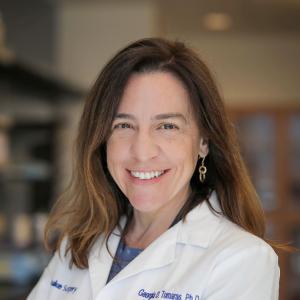
Georgia Tomaras, Ph.D.
Contact
Dr. Georgia Tomaras is a Professor of Surgery (with tenure), Professor of Immunology, and Professor of Molecular Genetics and Microbiology and a Fellow of the American Academy of Microbiology and the American Association for the Advancement of Science. Dr. Tomaras obtained her B.S. in biology from the University of Michigan, Ann Arbor, and her Ph.D. in Microbiology and Immunology from SUNY Upstate Medical University, Syracuse, New York and completed her postdoctoral fellowship at Duke University.
Dr. Tomaras is the Division Chief of Surgical Sciences, Director of Immunological Sciences for the Duke Center for Human Systems Immunology, and the Director of the Duke Center for AIDS Research. She is the Chair of the National Institutes of Health AIDS Vaccine Research Subcommittee and Chair of the NIH Vaccine Research Center Board of Scientific Counselors. Her research is focused on understanding immune variation in response to infection and vaccination to elucidate ways to maximize immune potential. She explores the mechanisms that effector cells engage in for clearing infection in vivo, and her laboratory applies systems immunology approaches to discover how protective immunity is achieved. Dr. Tomaras has authored over 300 peer-reviewed publications, many of which focus on immune correlates of protection for effective vaccines and discoveries to bridge basic and translational science for improving human health. She is a multi-PI for the NIH-funded international HIV Vaccine Trials Network for HIV and Tuberculosis vaccine candidates, serves as a laboratory lead for the NIH-sponsored COVID vaccine network; is the PI of a multi-institution P01 to understand antibody effector functions and IgA biology; and is the Director of the Assay and Reagent Core for the Duke Collaborative Influenza Vaccine Innovation Center, which aims to develop more durable, broadly protective, and longer-lasting influenza vaccines. Dr. Tomaras is the PI of a Bill & Melinda Gates funded “Antibody Dynamics” platform to evaluate the biophysical properties of protective antibodies against malaria, SARS-CoV-2, typhoid, and rotavirus. In the past 2 years, her laboratory has contributed data and new methods to interrogate SARS-CoV-2 specific immunity in infection and vaccination. In addition, she collaborates with the Coronavirus Immunotherapy Consortium to identify and characterize potent SARS-CoV-2 specific antibodies for antibody-based immunotherapies.